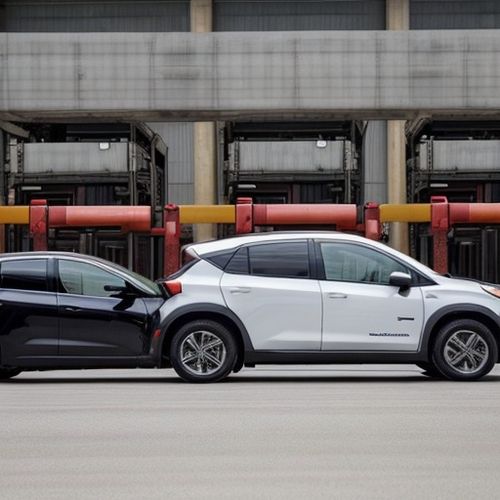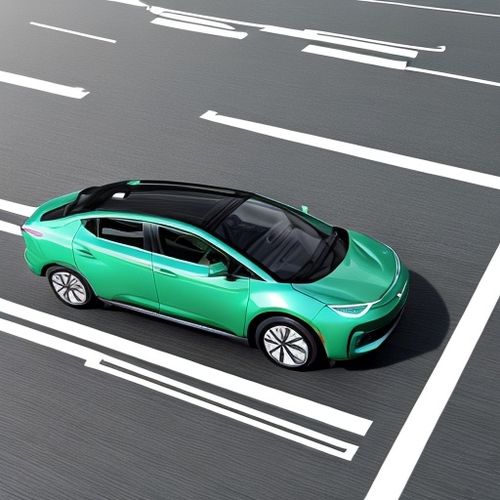Japan, a country known for its technological prowess, has been at the forefront of innovation in the automotive industry. The latest development to emerge from this island nation is the advancement in wireless electric vehicle (EV) charging technology. This breakthrough has the potential to revolutionize the way we power our vehicles, making the process more efficient, convenient, and environmentally friendly.
A New Era in EV Charging
The concept of wireless charging is not new; it has been used in various applications, such as smartphones and small electronic devices. However, applying this technology to electric vehicles presents a unique set of challenges. Japan's research and development efforts have been focused on overcoming these obstacles, leading to significant strides in making wireless EV charging a reality.
Overcoming Technical Hurdles
One of the primary challenges in wireless EV charging is the efficiency of energy transfer. Traditional wired charging methods have high efficiency rates, and any wireless system must match or exceed these to be viable. Japanese engineers have been working on improving the magnetic resonance and inductive coupling technologies that facilitate wireless power transfer, ensuring that the energy loss is minimal and the charging process is as efficient as possible.
Infrastructure Development
The commercialization of wireless EV charging technology requires not only advancements in the vehicles themselves but also the development of supporting infrastructure. Japan has been investing in the creation of charging pads and stations that can be installed in various locations, such as parking lots, garages, and even along highways. This infrastructure will allow EVs to charge wirelessly while they are parked or even while they are in motion, a concept known as dynamic wireless charging.
The Role of Government and Industry Partnerships
The Japanese government has played a crucial role in fostering partnerships between automakers, technology companies, and energy providers. These collaborations have been instrumental in driving the research, development, and deployment of wireless EV charging solutions. The government's support has helped to create a conducive environment for innovation, where companies can experiment with new technologies and bring them to market faster.
Environmental Benefits
The environmental impact of wireless EV charging is another significant factor driving its development. By reducing the need for physical connections during the charging process, the risk of electrical hazards is minimized. Additionally, wireless charging can help to reduce the carbon footprint associated with EV charging, as it allows for more efficient energy use and can potentially be integrated with renewable energy sources.
Consumer Adoption and Market Potential
As with any new technology, consumer adoption is a critical factor in the success of wireless EV charging. Japanese automakers are working to ensure that their vehicles are compatible with the new charging systems, and they are also focusing on educating consumers about the benefits of this technology. The market potential for wireless EV charging is enormous, as it addresses a key pain point for EV owners—the inconvenience of plugging in and the time it takes to charge their vehicles.
Global Implications
The progress made by Japan in wireless EV charging technology has global implications. As the world moves towards more sustainable transportation solutions, the adoption of wireless charging could significantly accelerate the transition to electric vehicles. Countries around the world are watching Japan's developments closely, with many considering how they can integrate this technology into their own transportation infrastructure.
Future Outlook
The future of wireless EV charging looks promising. With ongoing research and development, improvements in efficiency, and the potential for integration with smart grid technologies, wireless charging could become the standard for EV power supply. Japan's leadership in this field is a testament to its commitment to innovation and sustainability, and it is likely that we will see more countries following suit in the coming years.
Japan's wireless EV charging technology is not just an incremental improvement; it represents a paradigm shift in how we think about and approach vehicle charging. As the commercialization of this technology accelerates, it is set to change the landscape of the automotive industry and contribute to a greener, more efficient future for transportation worldwide.

By Sophia Lewis/Apr 6, 2025

By Thomas Roberts/Apr 5, 2025

By Emma Thompson/Apr 5, 2025

By Sarah Davis/Apr 5, 2025

By John Smith/Apr 5, 2025

By Laura Wilson/Apr 5, 2025

By Christopher Harris/Apr 5, 2025

By Emma Thompson/Apr 5, 2025

By David Anderson/Apr 5, 2025

By James Moore/Apr 5, 2025

By James Moore/Apr 5, 2025

By Natalie Campbell/Apr 5, 2025

By David Anderson/Apr 5, 2025

By Grace Cox/Apr 5, 2025

By Thomas Roberts/Apr 5, 2025

By Christopher Harris/Apr 5, 2025

By Michael Brown/Apr 5, 2025